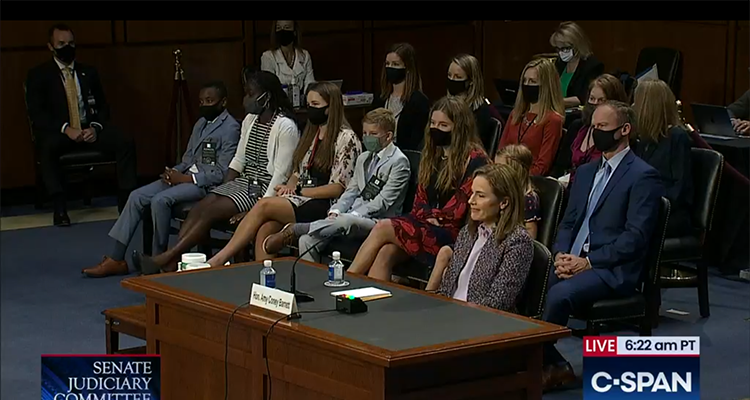What you need to know for Day 4 of Judge Amy Coney Barrett's confirmation hearing

Judge Amy Coney Barrett was joined by members of her family on Wednesday, her final day of testimony. Image from C-SPAN.
Supreme Court nominee Amy Coney Barrett is done testifying, but her confirmation hearing before the Senate Judiciary Committee continues on Thursday.
On the agenda are appearances by two representatives of the ABA Standing Committee on the Federal Judiciary, which gave Barrett a “well qualified” rating. Others who will be testifying include a retired federal appeals judge, representatives of advocacy groups, a former law clerk to Barrett and a former Notre Dame law student of Barrett’s, report the National Law Journal and USA Today.
Some witnesses will talk about how Barrett’s potential rulings as a Supreme Court justice would affect them personally.
The ABA standing committee representatives are its chair, Randall Noel of Memphis, Tennessee, and Pamela Roberts of Columbia, South Carolina, the lead evaluator for Barrett’s evaluation. In prepared testimony, Noel said Barrett had high praise from lawyers and judges who spoke with the standing committee in all three areas it considers: integrity, professional competence and judicial temperament.
Republicans scheduled an Oct. 22 committee vote on Barrett’s confirmation as Democrats sought an indefinite delay on Thursday, the New York Times and Politico report. The full Senate could vote by Oct. 26.
Barrett, currently a judge on the Chicago-based 7th U.S. Circuit Court of Appeals, wrapped up her testimony on Wednesday.
Barrett told senators that sharing the late Justice Antonin Scalia’s originalist and textualist judicial philosophy doesn’t mean “every sentence that came out of Justice Scalia’s mouth or every sentence that he wrote was one that I would agree with,” she said.
Democratic Sen. Christopher Coons of Delaware asked Barrett whether she agreed with particular decisions by Scalia, but Barrett would not answer. “I hope that you aren’t suggesting that I don’t have my own mind,” she said.
One of the cases Coons talked about was Griswold v. Connecticut, the 1965 Supreme Court decision holding that married couples have the right to use contraceptives in the privacy of their home. Scalia had said the case was wrongly decided.
Barrett said she wouldn’t give her view on the case, while adding its precedent was very “unlikely to go anywhere” because no legislature will outlaw contraception. She added that Coons’ questions appear to be laying the groundwork for questions about whether Roe v. Wade was wrongly decided, something she couldn’t address.
Barrett was also questioned about tweets by President Donald Trump and whether she believes a president who refuses to comply with a court order is a threat to our constitutional system. Barrett didn’t answer that question or a query about whether the president can pardon himself.
Barrett did say that no one is above the law, but a court cannot control how the other branches of government respond to its rulings. “The Supreme Court can’t control what the president obeys,” Barrett said.
One Republican senator, Sen. Joni Ernst of Iowa, asked Barrett how she would respond to those who say she is not an adequate replacement for the late Justice Ruth Bader Ginsburg.
Barrett said there is room on the Supreme Court for justices who take different approaches to constitutional law, and those approaches “shouldn’t be broken down into partisan boxes because judges are not partisan.”
Barrett said she believes judicial philosophy is an appropriate topic to explore, and it’s a perfectly understandable ground for a vote against her confirmation.
Day Three
- Is Barrett an adequate Ginsburg replacement? Debate over philosophy is appropriate, she says
- Barrett won’t give her opinion on ‘contentious matter’ of climate change
- ‘I hope that you aren’t suggesting that I don’t have my own mind,’ Barrett tells senator
- SCOTUS nominee says she’d keep an open mind about cameras in the high court
- Barrett: No one is above the law, but Supreme Court can’t force other branches to comply with judgments
- Barrett: Sharing Scalia’s philosophy doesn’t mean I agree with every sentence he said
Day Two
- Sen. Booker complains of rushed nomination process for Barrett, notes Notre Dame profs’ call for delay
- After seeing George Floyd video, Barrett says she wept with her daughter
- Barrett says she doesn’t see Roe v. Wade as ‘super precedent’
- SCOTUS nominee Barrett says she’s not ‘hostile’ to the Affordable Care Act
- Would Barrett recuse in 2020 election case? She spoke of appearances but didn’t answer the question
- Barrett: Racism and discrimination is ‘abhorrent’; ‘I have never discriminated on the basis of sexual preference’
Day One
- In delayed remarks, retired Notre Dame law dean praises Barrett as ‘brilliant but humble’
- Democrats at Barrett confirmation hearing focus on health law, even as they label proceedings a ‘sham’
- Judge Amy Coney Barrett rated ‘well qualified’ for Supreme Court by ABA standing committee
- Barrett tells of lessons learned from Scalia in confirmation hearing opening statement



